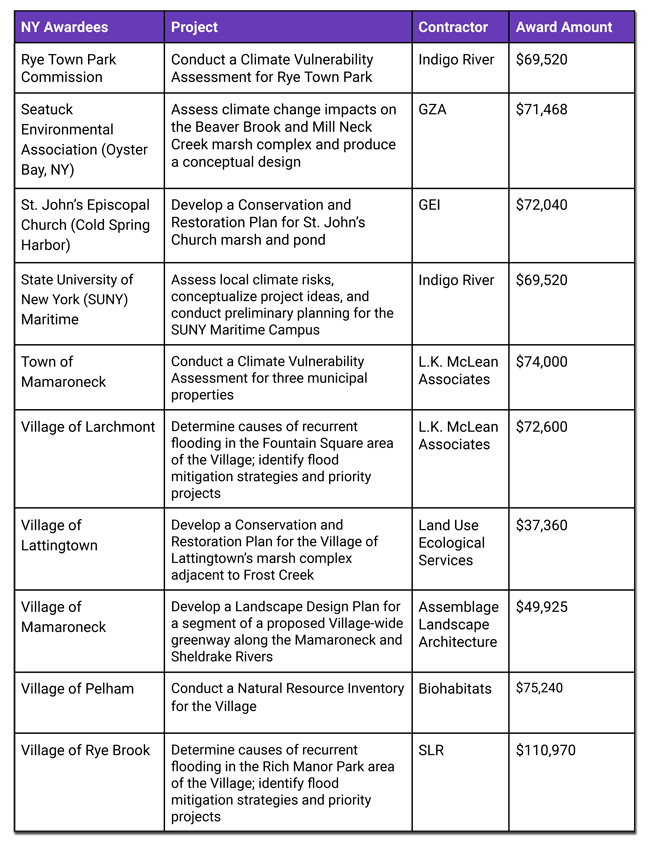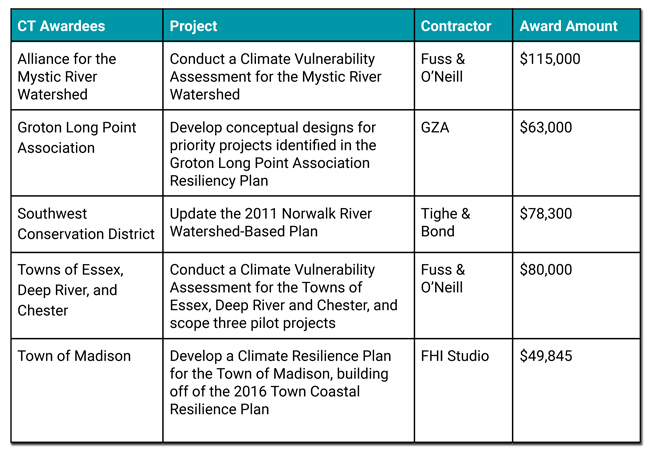The Long Island Sound Study and Sea Grant programs in NY and CT announced the initial cycle of projects under the Long Island Sound Resilience Planning Support Program at Rye Town Park on December 6, 2024.
Contacts:
Judy Benson, Connecticut Sea Grant communications coordinator, E: judy.benson@uconn.edu
Paul C. Focazio, New York Sea Grant communications manager, E: paul.focazio@stonybrook.edu
Summary:
• The Long Island Sound Resilience Planning Support Program provides planning support to advance resilience-focused projects by matching communities with qualified contractors to assist with their needs, with no match required from communities.
• Ten NY communities — six in Westchester County, one in the Bronx, two in Nassau County, and one in Suffolk County — and five CT communities — one in Western CT and four in Eastern CT — received awards through the first round of the program. See 2024 Resilience Awards fact sheet (pdf) for additional details.
• Find more project details at lisresilience.org/assistance-programs.
• A second round of the program opened on December 6, 2024, with up to $1 Million in funding available again.
Rye, NY, December 6, 2024 - Thanks to a new bi-state program, 15 coastal communities in the Long Island Sound region have been awarded nearly $1.1 million in planning support to advance resilience-focused projects. The Long Island Sound Resilience Planning Support Program was created by New York Sea Grant (NYSG) and Connecticut Sea Grant (CTSG), funded by the U.S. Environmental Protection Agency through the Long Island Sound Study.
Since 2021, a team of dedicated NYSG and CTSG Sustainable and Resilient Communities (SRC) Extension Professionals has focused on developing resources and tools to assist Long Island Sound communities in achieving their sustainability and resilience goals. A major barrier for many communities is a lack of capacity and resources to identify, conceptualize, and develop climate resilience projects.
In response, the SRC team launched the Long Island Sound Resilience Planning Support Program in October 2023. The program provides planning support to advance climate resilience-focused projects by matching participating communities with qualified contractors to assist with assessing local climate risks, conceptualizing project ideas and conducting preliminary planning efforts to prepare for future funding opportunities that support project design and implementation. No match is required from the communities.
Fifteen projects—10 in NY and five in CT—are being supported through the first round of the program. The 15 projects include climate vulnerability assessments and resilience plans, watershed-based conservation plans, natural resource inventories, conceptual designs for flood mitigation opportunities and landscape design plans. Find more details below and at: lisresilience.org/assistance-programs.
“This funding empowers coastal communities across Long Island Sound to address critical climate challenges locally and collectively build a more resilient Sound,” said EPA New England Regional Administrator David W. Cash. “These awards are another example of EPA’s longstanding commitment to protecting and restoring Long Island Sound, which is one of the most special natural places in the country.”
“EPA is pleased to support the projects in these 15 local communities to strengthen their resilience to climate change and develop practical solutions to reduce flooding, improve water quality, and protect coastal habitats and wildlife in the Long Island Sound,” said EPA Regional Administrator Lisa F. Garcia. “EPA supports efforts that assist coastal communities in assessing climate vulnerabilities and developing plans and actions for a sustainable future.”
“The outcomes of this program will go far beyond the immediate planning efforts,” said New York Sea Grant Director, Rebecca Shuford. “By equipping communities with actionable plans and innovative project concepts, we are setting the stage for transformative resilience initiatives that address climate vulnerabilities while promoting long-term sustainability. New York Sea Grant is proud to contribute to this partnership and support communities in their efforts to safeguard their environments and economies.”
“This program is a testament to the power of collaboration in addressing one of the most pressing challenges of our time—climate resilience. Through this initiative, Connecticut Sea Grant is proud to help bridge the gap for communities facing resource and capacity constraints, enabling them to take critical steps toward achieving their resilience and sustainability goals,” said Connecticut Sea Grant Director, Sylvain DeGuise. “We look forward to seeing the positive impacts these projects will have across the region.”
NYS Assemblyman Steve Otis, representing Sound Shore Districts in Westchester County, said, “These resiliency planning grant awards are vitally important in assisting local governments as they seek to address threats to coastal areas, water infrastructure, and valued habitats. Tremendous credit goes to Sea Grant and the Long Island Sound Study for supporting local planning efforts that will make future projects a reality. Federal dollars are vitally important to the health of our Long Island Sound estuary. Resiliency and flood mitigation projects will depend upon a combination of federal, state, and local funding. Congratulations to these local governments on their grant awards.”
A second round of the Long Island Sound Resilience Planning Support Program opened today, December 6, 2024. Up to $1 million will be available. Interested communities can learn more at lisresilience.org/assistance-programs.


“The Rye Town Park Commission is honored to be one of the first 15 awardees of the Long Island Sound Resilience Planning Support Program,” said Gary J. Zuckerman, Rye Town Supervisor and President of the Rye Town Park Commission. “Rye Town Park is an asset to our community, and the development of a Climate Vulnerability Assessment will assist us in navigating the effects of climate change and preserving the park for years to come."
“The Southwest Conservation District serves the communities of Wilton, Norwalk, New Canaan, Ridgefield, Weston, and Redding. Working with these communities, we are utilizing SRC funds to update and enhance the Norwalk River watershed based plan,” said Chris Sullivan, Southwest Conservation District Executive Director. “This new and improved document will provide the blueprint for improving water quality and resiliency across these communities. We are grateful for the opportunity and funds to do this valuable work.”
“The Village of Lattingtown is proud and thankful to participate in the Long Island Sound Resilience Planning Support Program. The program will provide us with the environmental tools we need to preserve our village and to protect our residents by restoring our marshland in a responsible manner, ensuring both storm preparedness and coastal resiliency,” said Robert Fagiola, Mayor of the Village of Lattingtown.
“Earlier this year, the Town of Mamaroneck was delighted to be awarded a $74,000 grant from the Long Island Sound Resilience Planning Support Program to fund a Climate Change Vulnerability Assessment. Conducting this assessment on three of our municipal properties will help us to determine and prioritize what actions are needed to mitigate our Town’s vulnerabilities in light of our changing climate,” said Jaine Elkind Eney, Town of Mamaroneck Supervisor. “We appreciate the commitment of this new program in giving Long Island Sound municipalities such as the Town of Mamaroneck the resources and tools necessary to help us reach our sustainability goals.”
“The Village of Rye Brook is very appreciative of being selected for this grant. The Rich Manor Park area is a location that repeatedly floods and, as such, impacts many neighboring properties. We are hopeful that this grant will be able to identify attainable solutions to mitigate this problem for the benefit of the residents of this area of Rye Brook,” said Jason Klein, Mayor of the Village of Rye Brook.
“SUNY Maritime College, the first and foremost maritime institution in the country, is proud to be part of the initial round of the Long Island Sound Resilience Planning Support grants,” said Dr. Caterina Panzeca, Science Department Chairperson at SUNY Maritime College. “This planning grant brings together diverse campus stakeholders including faculty, staff, and students to address climate resiliency on our waterfront campus. We are currently developing a comprehensive plan that we hope will be a model for our Long Island Sound neighbors and the 63 other SUNY campuses.”
“The Town of Madison received first round funding through the Planning Support Program to update and expand upon our 2016 Coastal Resiliency Plan,” said Erin Mannix, Town Planner for the Town of Madison, CT. “We are eager to take this opportunity to create a broader climate resiliency plan, which will serve to evaluate and protect our shoreline community’s critical resources, infrastructure, and ecosystems. Identifying vulnerabilities and risks will better inform the Town as we plan for long-range resiliency and adaptation.”
“We are grateful for the opportunity to look at climate vulnerability along the Connecticut River and prepare for the future,” said Carey Duques, Land Use Official for the Town of Essex, CT.
“The Village of Larchmont is thrilled and honored to be one of the first recipients of the Long Island Sound Resilience Planning Support grant program. This grant will enable us to conduct a comprehensive study to determine the causes of recurrent flooding in the Fountain Square area of the Village of Larchmont,” said Sarah Bauer, Mayor of the Village of Larchmont. “Given the impact of climate change, this program gives municipalities additional tools to become more resilient and we truly value their partnership.”
“Sea Grant and Long Island Sound Study have been instrumental in the Village of Mamaroneck in providing knowledgeable support and professional design assistance for the Mamaroneck Greenway which is being developed along the lengths of the Sheldrake and Mamaroneck Rivers on the coastal plain of the village,” said Kate DeHais, member of the Village of Mamaroneck Committee for the Environment. “This linear park will connect new and existing park spaces whose ecology will be protected and restored with native plants, trees, and shrubs to support pollinators, birdlife and wildlife while also improving the health of wetland soils, enhancing their ability to hold carbon. For residents, It will provide green space for quiet recreation and educational opportunities in underserved areas as well as connectivity throughout the village. The design being created will also incorporate Green Infrastructure such as rain gardens to hold and infiltrate flood water, mitigating the pollution and destructive impact of flood events.”
For more information, please visit www.lisresilience.org or direct questions by email to info@longislandsoundstudy.net.
More Info: Long Island Sound Study
The Long Island Sound Study, established in 1985, is a partnership of federal and state agencies working with local governments, communities, universities and industry to protect and care for the Sound’s health. For more information, visit longislandsoundstudy.net.
More Info: New York Sea Grant
New York Sea Grant, a cooperative program of Cornell University and the State University of New York, is one of 34 university-based programs under the National Oceanic and Atmospheric Administration’s National Sea Grant College Program. For more information, visit www.nyseagrant.org.
More Info: Connecticut Sea Grant
Connecticut Sea Grant, based at UConn’s Avery Point campus in Groton, is one of 34 Sea Grant programs supported by the National Oceanic and Atmospheric Administration in coastal and Great Lakes states that encourage the wise stewardship of our marine resources through research, education, outreach and technology transfer. For more information, visit www.seagrant.uconn.edu.